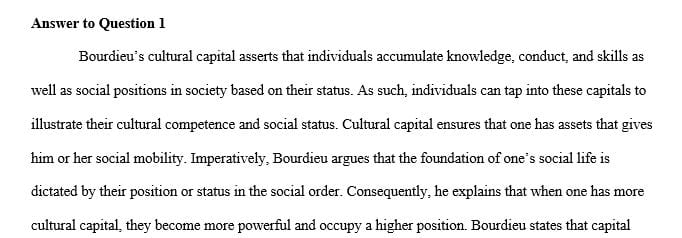Cultural Capital Theory explains the discrepancy in working class vs. middle class academic achievement
Cultural Capital Theory explains the discrepancy in working class vs. middle class academic achievement. What, specifically, is his explanation? Do you agree? Explain. (1/2 page)
There are three elements in Bourdeau’s definition of Cultural Capital: the Embodied State, the Objectified State and the Institutionalized State. Define each “state” in your own words and provide an example. (1/2 page)
Lareau uses Bourdeau’s theory to study class-based family transmission of cultural capital. She developed two concepts: Concerted Cultivation and Natural Growth. Which of the concepts most closely matches your childhood experience? Explain; provide examples. (one page)
Harvard
The plaintiffs in the Harvard case made very specific claims and a request. The defendant denied the claims. The judge ruled in favor of the defendant.
Use one of the theories we have discussed this semester as a framework to explain the judge’s ruling. How does the theory support her rationale for ruling in favor of Harvard?
Do you agree with her decision? Explain.
_collins harvard_aff_act_adm_case_2019 _bourdieu socs_177_theory_and_research_in_sofed__1_
Answer preview to Cultural Capital Theory explains the discrepancy in working class vs. middle class academic achievement
APA
940 words


